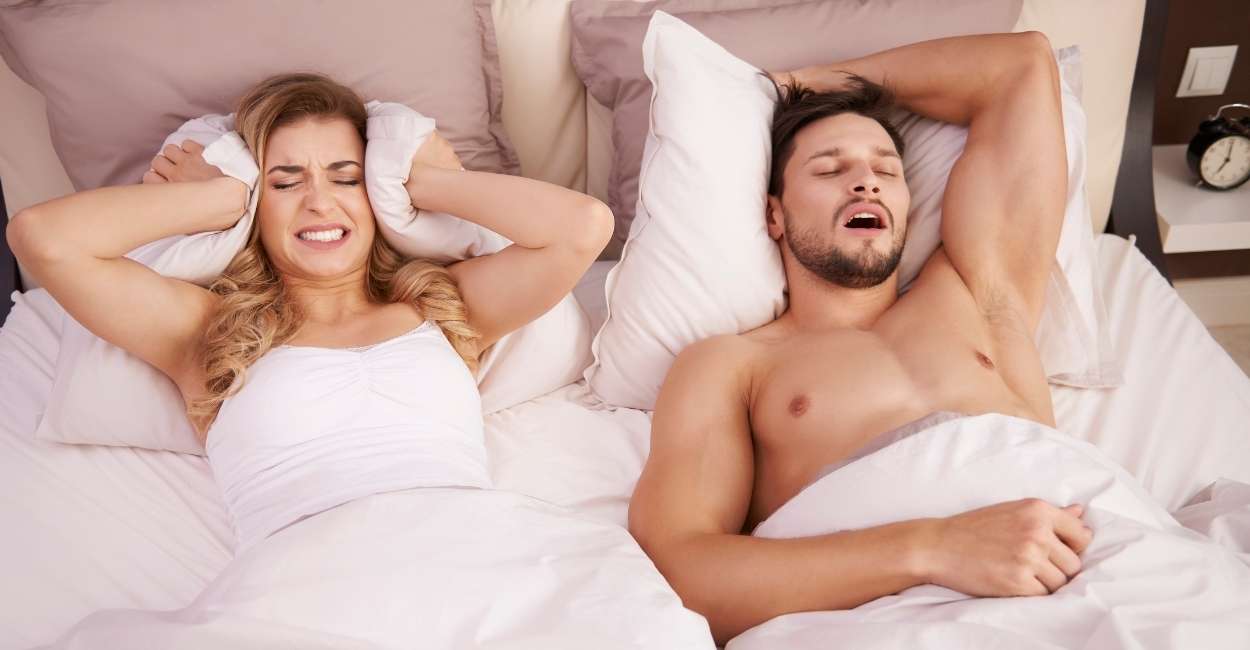Does your sleeping partner get annoyed because of your constant snoring? Or, do you frequently wake up gasping in your sleep?
If you want to bring a change to such issues in your night-time routine, a mouthguard to stop snoring or for your sleep apnea can rock your world.
NOTE
We have enlisted our recommended anti-snoring mouthguards in this guide, here.
So, if you’re ready to implement this change in your life, our guide is ready to help you!
How does a mouthguard work for snoring?
Snoring is the sound of turbulence and resistance in your upper airway or the back of your airway and not your nose.
It mainly happens when the oropharynx behind your tongue gets constricted in your sleep. This becomes more prominent in your REM sleep when your muscles get in a paralysis-like state.
The narrower airway leads to air turbulence and the soft tissues around the back of your throat vibrate which leads to this.
Anti-snoring mouthpieces and mouthguards help you prevent this entire issue by bringing the jaw forward. It widens your airway, reduces turbulence and resistance, and eventually stops your snores.
This also helps sleep apnea patients. Wondering what’s that? Let’s know it all here…
What is sleep apnea?
A sleep breathing disorder of recurring pauses in breathing in your sleep is called sleep apnea. Hourly, a patient faces multiple 10+ seconds of pauses.
Due to decreased blood-oxygen levels, the brain wakes the patient with a loud snort. If someone has snoring, daytime drowsiness, and breath pausing issues, it’s probably sleep apnea.
However, the FDA always asks sleep apnea patients to consult a doctor before getting these devices. Moreover, these devices aren’t suitable for central sleep apnea.
If you still don’t believe a mouthguard for sleep apnea or snoring exists, c’mon let’s check this out…
Do anti-snoring mouthpieces really work?
Anti-snoring mouth devices never promise your snoring will stop, but they help most people. Moreover, the device may work for the first few years and may not after that.
Specialists recommend going through these if snoring persists with the device…
1. Device usage
Double-check that you’re using the device properly. Your lower jaw must move forward more than your upper jaw. Book an adjustment session with an expert to understand the situation
2. Weight fluctuations
People snore more as they gain weight. So, if you weigh at least 5-10lbs more than the time you got your device, the device may not work. Lose weight and it might work as usual.
3. Alcoholism
If you consume alcohol within the last 4 hours before sleep, snoring gets worse. Change this schedule to mitigate the issue.
4. Sleeping position
Snoring is worse for back sleepers, so try to sleep on your side and the device will slowly work like before.
But hey, there are a lot of options available, so choose wisely from here…
Types of anti-snoring devices
While choosing an anti-snoring device, prioritize comfort over everything as it’ll encourage you to use it frequently and get quicker results. Check the different types to choose for yourself
1. Mandibular Advancement Devices (MAD) or Jaw Advancing Devices (JAD)
These devices move your jaw forward to widen your airway and keep the vibrating bits apart similar to simple snoring devices. The turbulence and hence snores decrease. Some brands provide ready-to-use products
Pros
- Helps with sleep apnea and snoring issues
- Often one-size-fits-all
Cons
- Teeth shifting and discomfort
2. Tongue Stabilizing Devices (TSD)
This device pulls forward the tongue to create a gap in the back of your throat. Some are ready to use, some require extra fitting. Many are adjustable with a wrench-like tool. You can choose a comfortable position as required.
Pros
- Reduces or eliminates snoring
- No jaw discomfort, teeth shifting, or TMJ
- Perfect for people with missing teeth
Cons
- People feel uncomfortable with tongue position due to more salivation
3. Snoring Chin Straps
These are like elastic straps around the jaw and head. It supports your chin to keep your jaws closed. This is a one-size fit all type
Pros
- Popular and doesn’t have side effects
Cons
- Low efficiency as per research
4. Boil and bite
These customizable mouthguards are put in boiling water for seconds and placed in the mouth after cooling.
Pros
- You can take multiple impressions if it goes wrong
Cons
- You might not get the perfect shape at once
However, you can’t get an anti-snoring device based on its pros and cons alone. So, let’s see the other details here…
Things to consider before you buy an anti-snoring device
Before you jump in and get yourself the best anti-snoring mouthpiece or the best sleep apnea mouthpiece in town, you must think through many more details, so follow these…
1. Denture
If you use dentures, anti-snoring devices won’t work for you. The devices that must grip your teeth like MAD can’t attach themselves to your jaw at all.
2. Bruxism Device
Never use anti-snoring devices as a replacement for brux guards or sports mouth guards even if their appearance and texture feel similar.
MADs sometimes offer protection from bruxism (teeth clenching issues). But they may not prevent the consequences of bruxism like abfractions.
3. Doctor’s recommendation
Snoring nose strips and sprays are over-the-counter treatments, i.e., don’t require a doctor’s prescription. However, in the USA, if any MAD is classified as a Class II device by the FDA, you need a prescription.
Snoring devices aren’t allowed to be used without a prescription usually because you might not recognize serious health issues like sleep apnea and deteriorate your situation.
4. Post-purchase situation
Even if you bought anti-snoring devices without your doctor’s order, always consult your dentist before you start using them. Discuss your dental practices and hygiene to make sure you don’t hurt your teeth.
After consultation, if you experience discomfort or pain, snoring persists, breaths pause, gasp in your sleep, feel drowsy during the day, or feel you have sleep apnea, get your doctor’s appointment right away.
5. Device care
If you take proper care of your anti-snoring device, it will last you longer and be more efficient. So, keep it away from babies and pets in a container as they like to chew on things.
Clean it with water and a toothbrush or use special cleaning solutions to prevent the growth of fungus and bacteria.
Anxious about the affordability? Let’s check it down below…
What’s the average cost of anti-snoring devices?
On average an anti-snoring device ranges from $30-$150. If you get a custom-made anti-snoring device from a dentist, it costs $500-$1000.
The expensive ones are usually adjustable. They don’t use latex as it’s a potential allergen. The high-end ones also avoid BPA-containing plastics as it gets absorbed in the body.
If you’re ready to implement these devices but don’t know which ones to trust, here are some top-recommended anti-snoring devices and mouthguards for sleeping…
What anti-snoring mouthpiece / anti-snoring mouth guard should you buy? – Our Top Recommendations
Everyone’s requirements aren’t the same, but there are basic benefits of using any anti-snoring device. However, it’s hard to lose track of the keywords that define a suitable device for you amidst the ocean of marketing phrases.
But not anymore, look over the best examples to find what really matters…
1. Good Morning Snore Solution Mouthpiece
You get 1 TSD mouthpiece in this pack based on Dr. Leslie Dort’s patented technology. It promises you fast snore relief.
Why it is on our list?
- FDA testing cleared, safe, and effective
- 30-day money-back guarantee
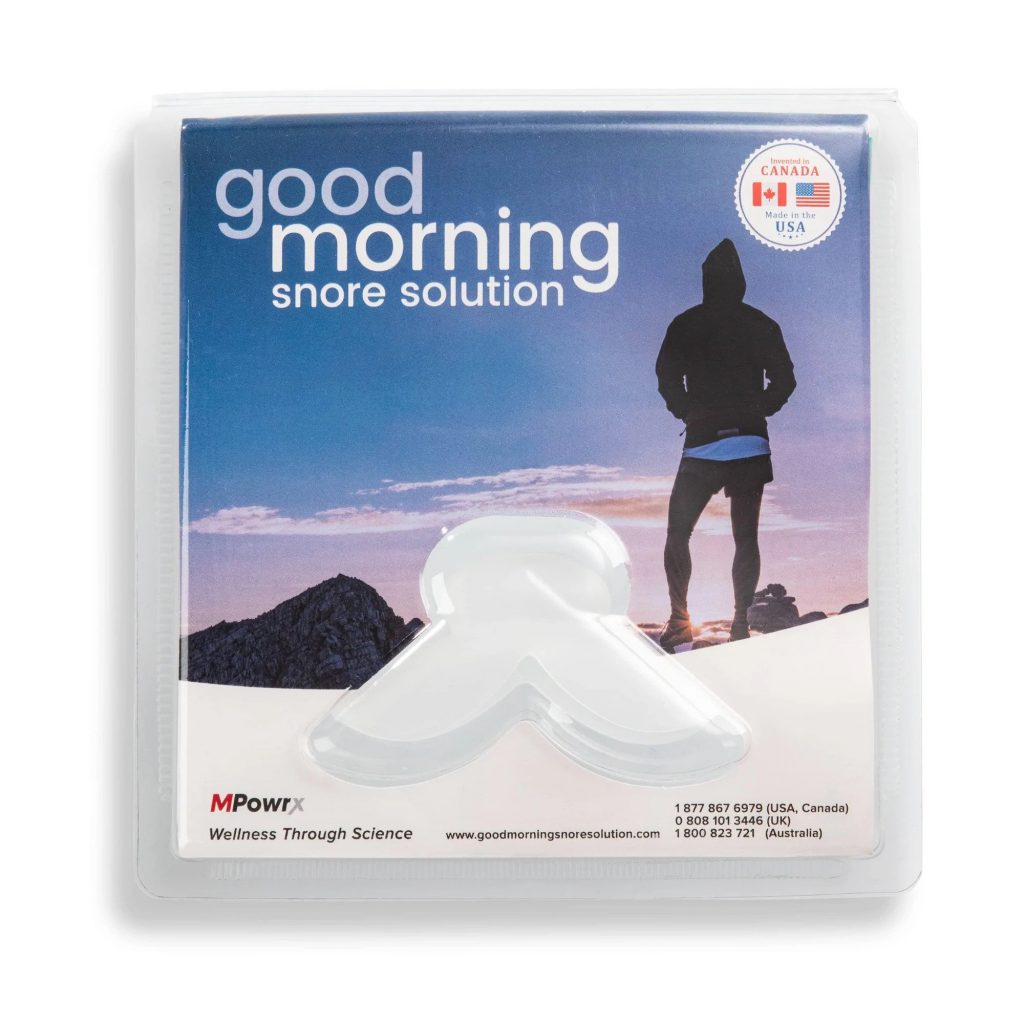
2. Good Morning Snore Solution Sizing Pack
This pack contains 2 TSD mouthpieces made in the USA; one is regular adult size and the other is a smaller adult size.
Why it is on our list?
- Cleared by: FDA, EEA, Health Canada, and ARTG
- 30-day satisfaction guarantee
- Suitable for beginners to know their size or for family
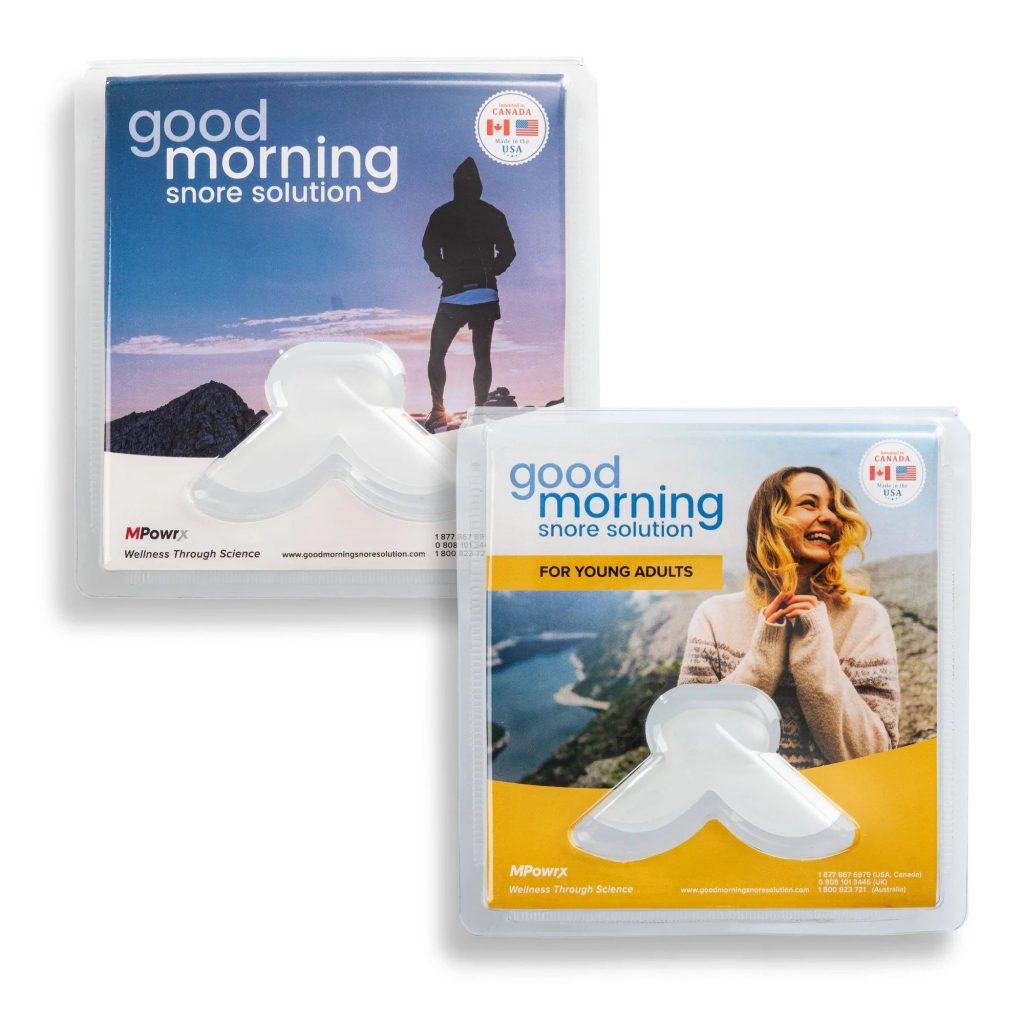
3. Good Morning Snore Solution Younger or Smaller Adult Mouthpiece
This pack contains 1 TSD mouthpiece for young adult size, made in the USA. Mainly suitable for 18-26-year-olds.
Why it is on our list?
- This one is modified to fit comfortably in young users’ mouth
- Clinically tested and approved by: FDA, Health Canada, EEA, and ARTG
- 30-day satisfaction guarantee
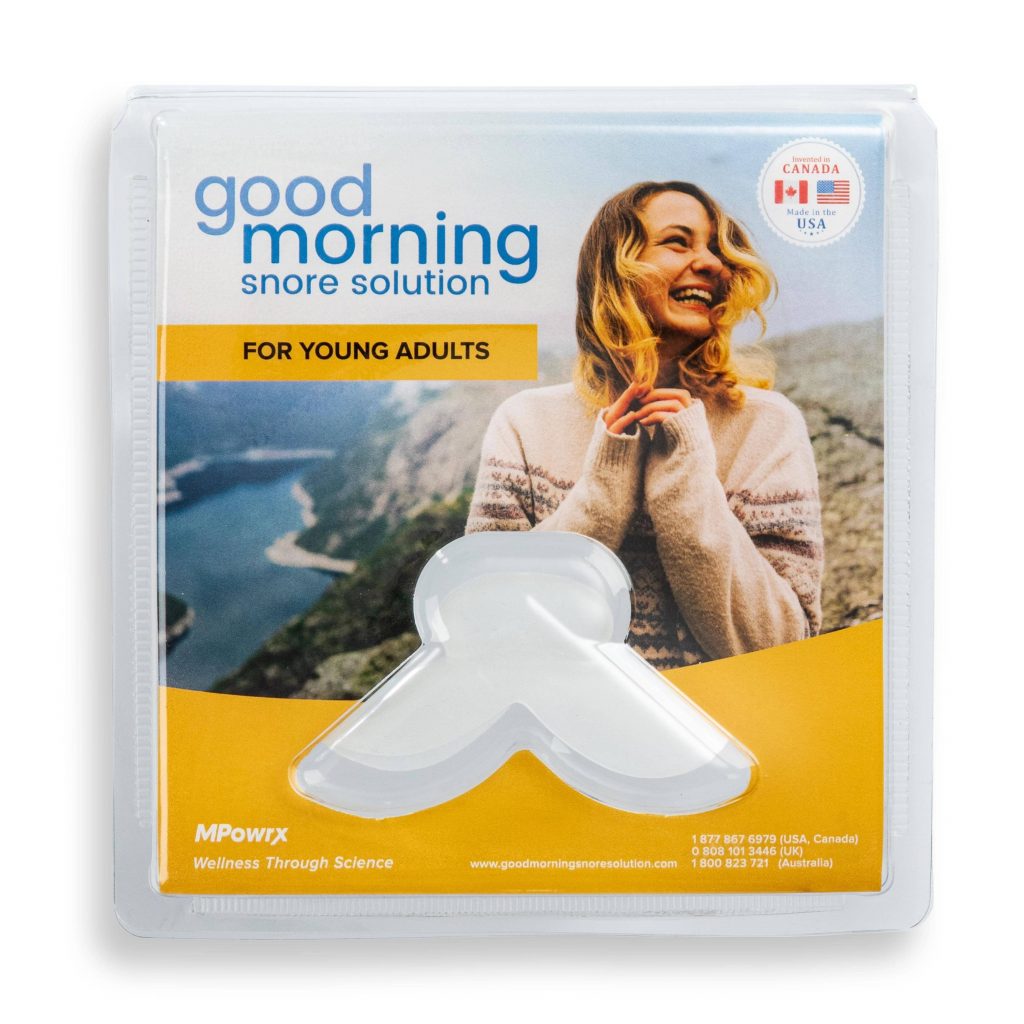
4. ZQuiet Anti-Snoring Mouthpiece Starter Pack
This Dentist designed USA-made mouthpiece stops your snores and helps you breathe easily.
Why it is on our list?
- Safe and comfortable
- 60-night guarantee
- FDA cleared
- Free shipping and returns
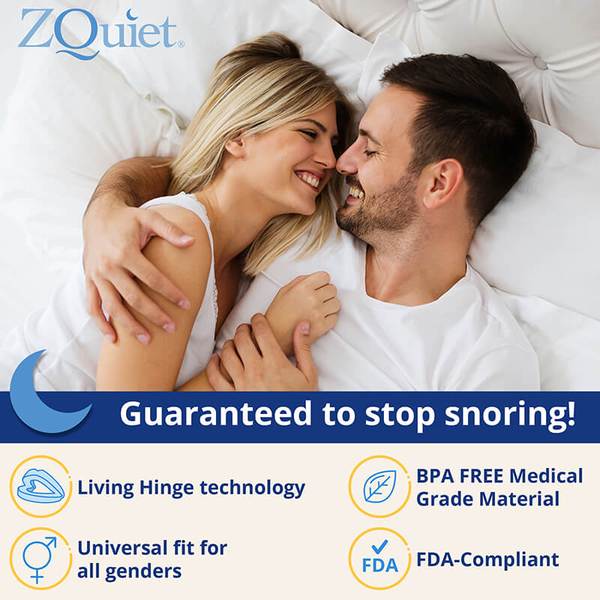
If you think anti-snoring devices are a one-time investment, let’s know the truth here…
When to replace your anti-snoring device?
This depends on how often you use your device. If you regularly use it, it won’t last you over a year. High-end ones might last a few years though.
However, teeth grinding and clenching wear these down. So, any sign of wear and tear even before 1 year calls for replacement.
Final Statement
The same type of anti-snoring mouthpiece or mouthguard might not be suitable for both you and your loved one.
So, even if someone recommends something they used and it doesn’t suit you, don’t feel disheartened. Try out all types because your needs might not be that common.
And always, prioritize your comfort, otherwise poor quality of your sleep might hamper your health even more.
Lastly, always consult a doctor about snoring issues to ensure you don’t overlook major problems. Be aware and spread awareness about anti-snoring mouthpieces and mouthguards to promote a healthier world.
